Kiki's Delivery Service is a Very Different Movie With Subtitles
- Studio Ghibli's films are beloved globally
- What kind of changes were made to these movies for American audiences?
- Jiji has no voice but it must scream

Introduction
Kiki’s Delivery Service is the story of a young witch who, at the age of 13, travels to the fantasy-Europeanesque city of Koriko in order to uphold a magical tradition. Every witch must go on a journey of self-discovery, just as her mother did. The 1989 Studio Ghibli movie, which was adapted from a novel by Eiko Kadono, takes a few liberations with the story and gives it a distinct Hayao Miyazaki narrative edge. Like Nausicaa of the Valley of the Wind and My Neighbor Totoro, Kiki’s Delivery Service is a movie about the celebration of tradition and nature in modern times. Studio Ghibli movies began coming to the states in the mid-1990s, and Kiki’s Delivery Service released in the US in 1998 with English voiceovers that most people seem to enjoy.
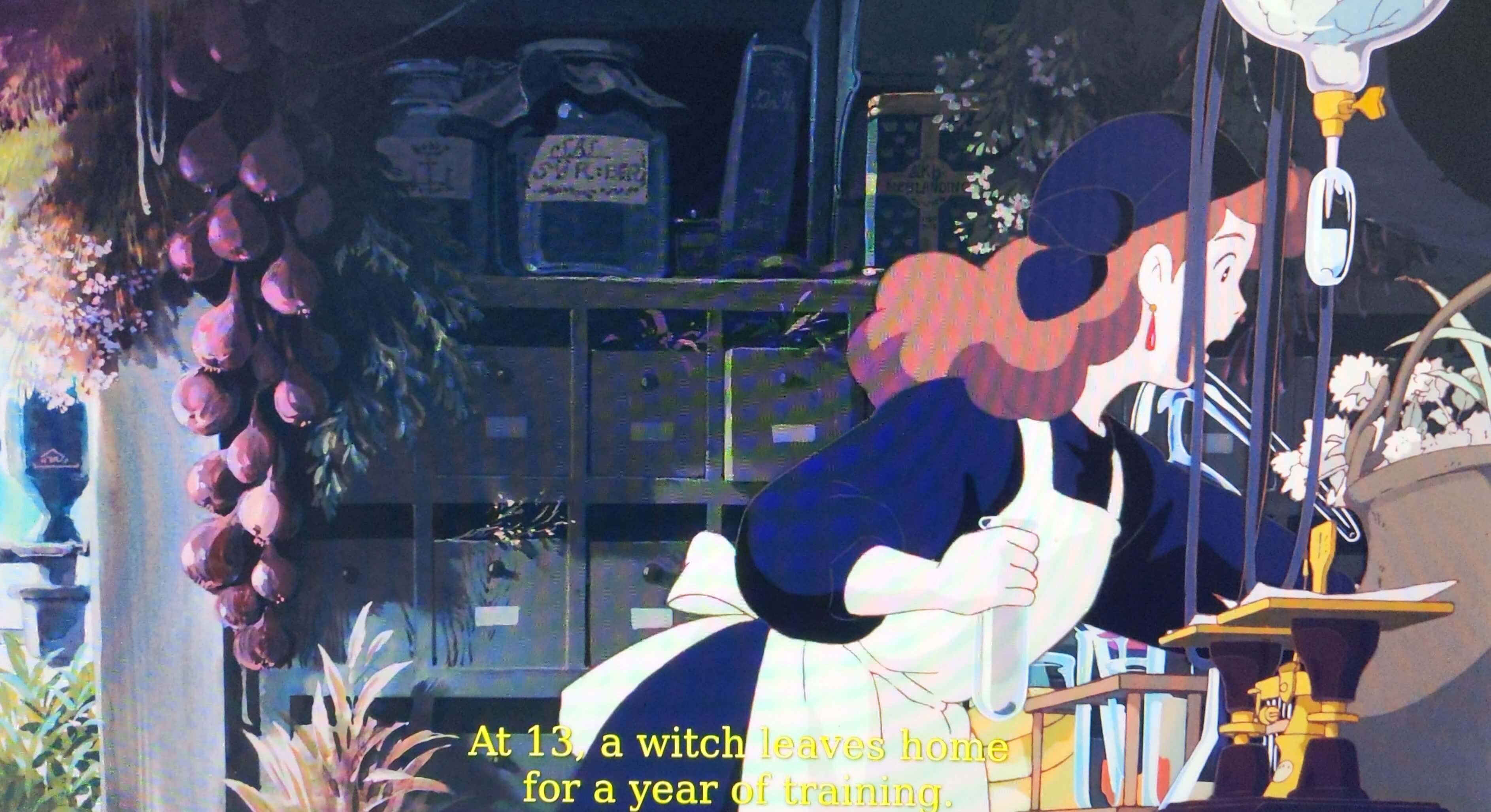
I require your strongest potions.
Miramax made a more than a few changes when they released the English dub. Egregious script change liberations are evident in just the first 15 minutes of the film. The Harvey Weinstein-produced film has a lot of things going for it; namely, it’s the last piece of work SNL alumnus Phil Hartman did before his untimely demise. But, story-wise, Miramax perverted one of Miyazaki’s most beloved films into an American teen’s coming-of-age story. Some people seem to be fine with this, and have a problem with the 2010 changes that were made to undo some of the changes.
Some people found Phil Hartman unfitting or obnoxious as Jiji, hating his general hamminess. I did not. But while I can’t fault those people, I would have preferred (as I mentioned above) something along the lines of a theatrical/director’s cut pairing of DVDs, not just quietly and effectively replacing the old version from the general market. Miyazaki approved the changes made to his work at the time, even if he didn’t agree with them. Now he, or someone else on his team, has pulled a George Lucas.
Miyazaki, I love you man. I respect you so much. I’ve visited your museum in Mitaka and it was magical. But please don’t do stuff like that.
I can’t say which version is better, because all versions have their own values and merits. I just miss the ad-libbing, the mickey-mousing, the wonderfully fitting Sydney Forest songs I sang along with every time.
I’ll keep the new DVDs and the new and interesting features available on the second disc, but I’m determined to get a copy of pre-2010 Kiki. I advise all fans of the original Disney dub to be wary, lest you get the shocking, depressing surprise I got. For everyone else who may or may not care in this instance, look into the production of some of your favorite shows and movies. They take a lot of work to make the finished product, and you might learn some interesting things about what is and what could have been.
EDIT 7/8/2010: Miramax actually was not involved with the English dub script of Kiki's Delivery Service. The translations came from Streamline Pictures and Disney handled the dub themselves. Disney then added several lines and soundtrack changes, which were removed in 2010. Thank you to redditor u/Minion_Soldier for this information!
EXHIBIT A: The Old Lady
There's evidence like this throughout the movie, but I only need to go through three sections of the intro to get to my point. I recommend watching these films in both languages fully to see the scope of what I’m talking about. HBO Max has both versions available to stream. These changes might not seem to be large at first, but reading the scripts side-by-side paints a different picture.
The movie starts with Kiki listening to her father’s radio. There will be a clear sky and full moon tonight. In the English dub, the reporter mentions it will be a special night.
Kiki runs back home and announces her intended departure to her mother. She is busy crafting and selling potions; nervous but excited. She is with an oba-san, whom is picking up some medicine.
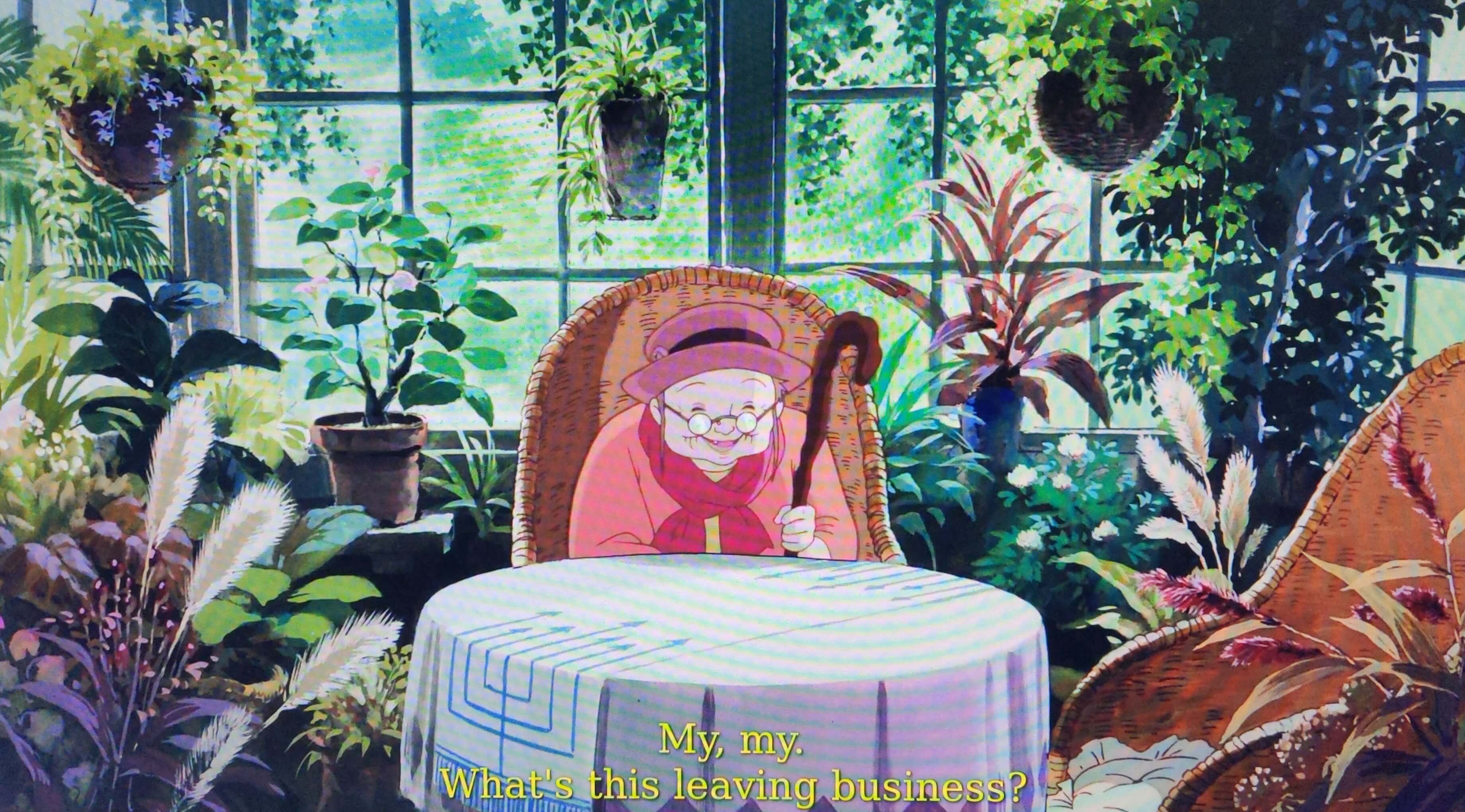
She's adorable. Classic Ghibli old lady.
This introductory setup is great storytelling for so many reasons. First, Kiki is shown to be a curious young child who is fulfilling a family tradition; she has a lovely house with a magical mom and loving father with a community support system most commonly found in rural villages. Her family and her community are excited to see her off to Koriko that night. Kiki’s mother helps her dawn the iconic black robe and they share a tender moment about what it means to grow up and listen to your heart. After a brief snippet of chat from some neighbor girls, Kiki flies off and the introductory credits roll.
When you read the text closely, in Japanese, Kiki seems to be more independent. The story sets her up for self-reliance in both her destination and ability, but the English dub narrative does a worse job of it. Let’s start with the retelling of the story of Kiki's mother’s arrival:
“OLD LADY: A little girl flew down from the sky on her broomstick, and I was certain she was much too young to hold such an important job as resident witch.
MOM: Yes, but I could fly. And kiki barely knows how to do that. And I’ve had no time to teach her how to mix potions like me.
OLD LADY: Young people are all the same. They all want to do something different. But I hope you at least get to teach her the potion that cures my rheumatism.”
Thematically, the English dub is mimicking the Japanese story:
- Background information on the mother/witch tradition
- Mother’s expression of concern for her child, as she’s too busy to teach her potion brewing
- Oba-san’s opinion on “the youth of today”, which represents a thesis statement for the movie
But now let’s compare this to the Japanese subtitles.
OLD LADY: A little 13-year old girl came down from the sky...riding a broomstick, her eyes shining. I thought you were a bit full of yourself.
MOM: But Kiki still has much to learn. She hardly knows any of my potions. After I’m gone, who will make this medicine?
OLD LADY: A sign of the times, I’m afraid. Everything changes, bit by bit. But I have to say, nothing works as well for my rheumatism.”
The bolded differences here might not seem like the biggest departures, but these insights rob Kiki of a lot of agency. Throughout the movie, Kiki’s ability to fly is in question, but at the start of the Japanese subs, she’s a novice, rather than implied to be unskilled. Her mother’s criticism is softer and more endearing. And the old lady denounces Kiki’s childish intentions in English, while in Japanese she ponders wistfully on the nature of modern society.
SIDE NOTE: Jiji Loses Her/His Mind
After this scene we meet the father, who is informed their planned camping trip has been canceled. Also, Kiki’s taking the radio, thanks Dad. Kiki packs with her cat, Jiji, and the father informs everybody in the community and extended family.
In Japan, the character of Jiji is an established female archetype voiced originally by veteran VA Rei Sakuma. Japanese Jiji is a regal uppity kitty who wants to travel at the right moment. In America, Miramax must have thought it would not translate well, so Phil Hartman voices a different, male Jiji. This Jiji is more of a “scaredy-cat” who's afraid to go on the journey. He wants to be cautious, and nervously interjects sometimes in moments where Japanese Jiji is silent. Phil Hartman apparently ad-libbed lines, including toward the end, which was removed in 2010.
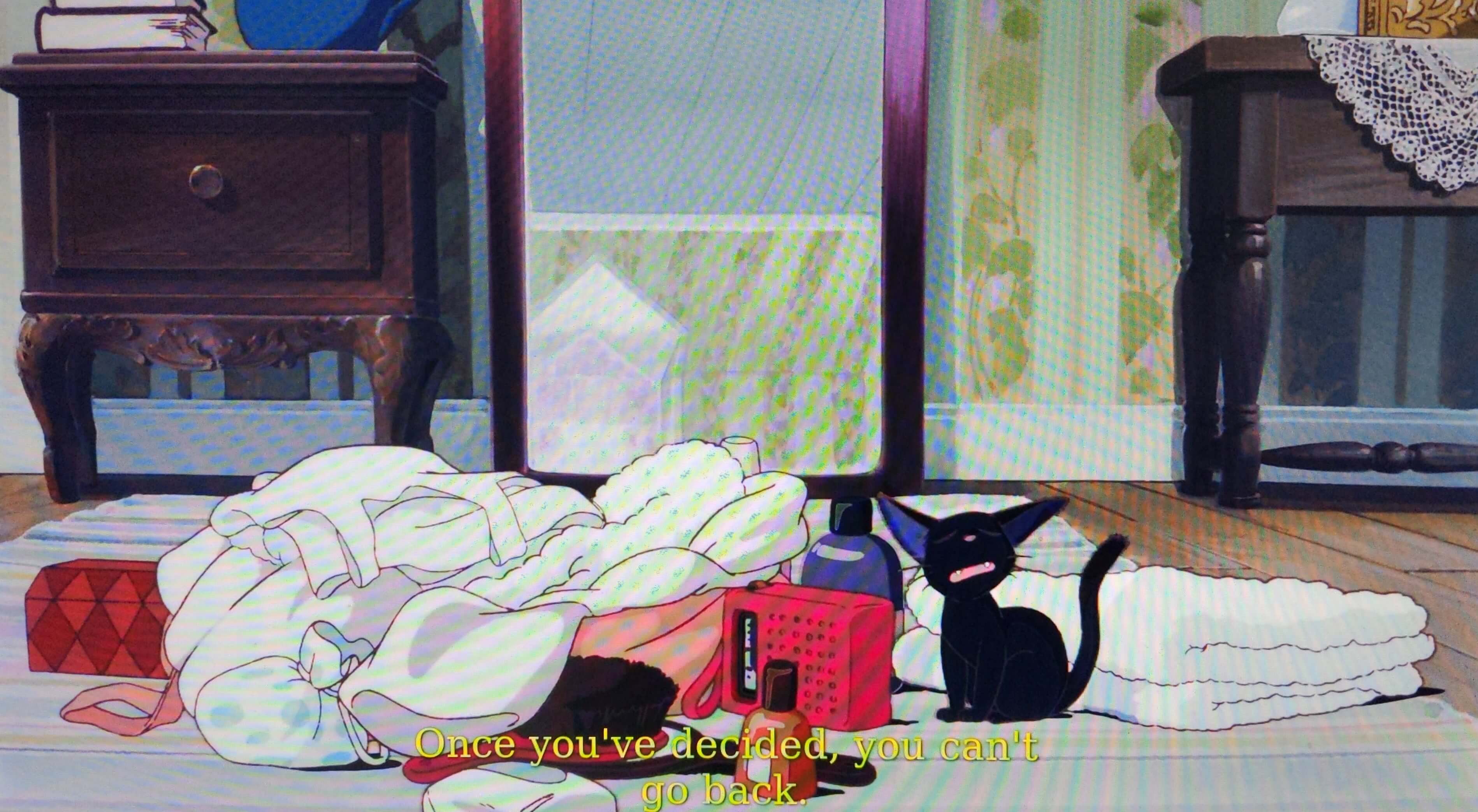
Best Ghibli mascot character don't @ me
SPOILERS SO DO NOT READ THIS IF YOU DON’T WANT TO BE SPOILED ON THIS 30-YEAR-OLD MOVIE. At the end of the film, Jiji loses the ability to speak. Kiki’s magic weakens and Jiji kind of becomes a normal cat, instead of a familiar. The climax and resolution of the movie restores her power, but in Japan, it’s not stated directly if Jiji gets her voice back. Miyazaki has stated previously that this represents Kiki’s growth into adulthood; I personally believe it also symbolizes a celebration of the natural world. But, in the original 1998 dub, Phil Hartman’s voice came back, which apparently angered a lot of fans.
To me, this change robbed a key message from the end of the movie. Jiji seeming to lose the ability to talk and act human is kind of an existential nightmare, but thematically powerful. Hayao Miyazaki’s films are about honor and love for nature and tradition clashing with modernity. Jiji returning to a natural state is a resolution meant to reflect this. American audiences, myself included, might misinterpret that, but changing the ending of the movie betrays the creator’s vision.
EXHIBIT B: The Clothes
The mother helps Kiki prepare her travel outfit.
MOM: Very Pretty.
KK: Lilac would look prettier on me, or white.
MOM: Witches have worn this color for a very long time, Kiki.
KK: Oh mom. I look really dumb.
M: It’s not really important what color your dress is. What matters is the heart inside.
KK: Well I’m gonna be the very best witch I can be, mom. And I know having a good heart is important.
MOM: Just follow your heart and keep smiling.
The story beats here are Kiki being unhappy with her outfit and being told to value her own feelings. But, the tone she takes in English seems a bit whiny. How does she do it in the Japanese version?
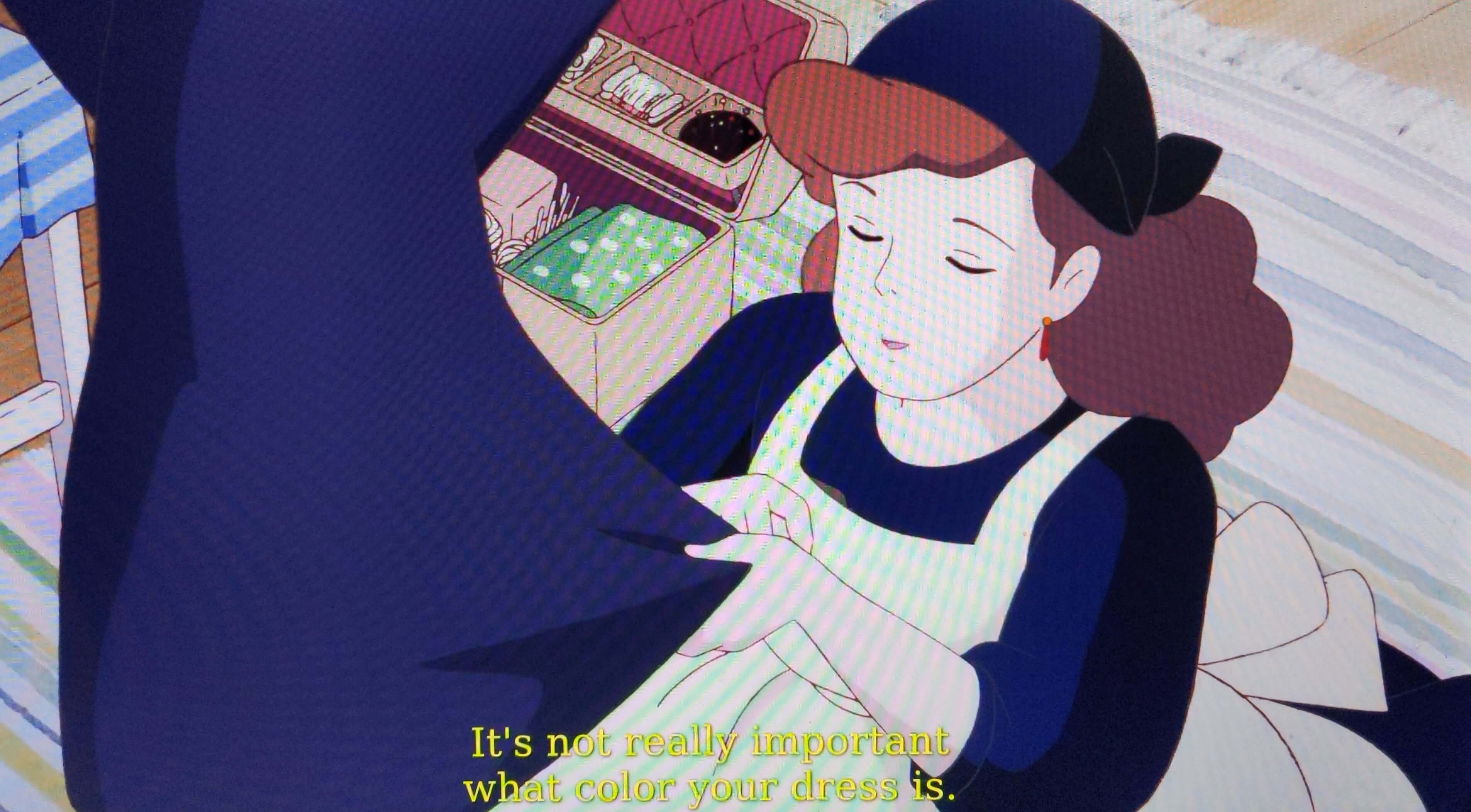
#momgoals
“MOM: Not bad.
KK: I wish it were a different color.
MOM: Witches have always worn this color.
KK; Black cat, black clothes. (Kuroneko ni kurokku de burakku)
MOM: It’s not really important what color your dress is. What matters is the heart inside it. (Taisetsuna ya kokoro yo)
KK I know having a good heart is very important, Mom. I wish I could show you that my heart is ready.
MOM: Just follow that heart and keep smiling.
She’s not asking for two specific, gender-coded colors. Just literally any color besides black. When she says “I look dumb” in English, she makes a funny play-on-words to mock her outfit in Japanese. In the English dub, it sounds less like Kiki’s mother is informing her about the importance of her heart, rather than reminding her. And in Japanese, she expresses her desire to demonstrate her abilities, and in doing so, verifies that Kiki feels like she’s in control.
EXHIBIT C: The Departure
There’s only one more change in this intro I would like to point out, which is the scene right before the opening song. Kiki is being sent off by the village and all the similarly-aged girls have crowded around her. They are dressed in modern garb, a stark contrast to her all black. They all are happy to see her off and ask her where she’s going to go.
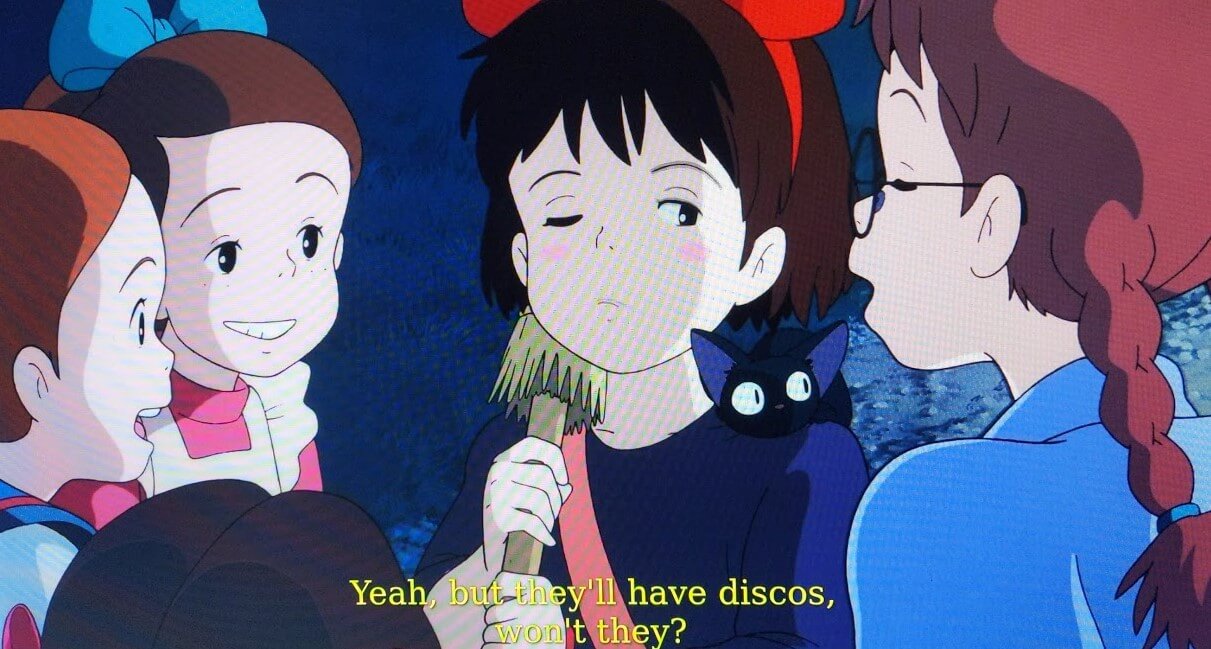
"What's she tryna tell me..."
In the dub, they ask if she’s going to find a boyfriend. But in Japanese, they ask if she’s going to go to a disco.
The implication here is similar, but not the same. Kiki might go to a discotheque to find a boyfriend, but that’s a simplification. Kiki finding a nightclub is a juxtaposition; her traditional family values clash with modern childhood wonder and desire. In the dub, her simply looking for a boyfriend removes a lot of symbolism.
Conclusion
I love this film. It has a special place in my heart as one of the iconic Ghibli films that’s a great family movie. Kids and adults can enjoy the lighthearted adventure without a (beautiful) scary bug or giant wolf/forest deity. Everyone should experience this film with whichever version they like.
But to understand the story in its original form, please watch the movie with subtitles. I think the English dub is still a good movie. Ghibli’s magical films have enough clout in America that these older movies are constantly being revisited, and it’s important to remember that culture is relative. A Ghibli movie with any changes in the script is not going to be 100% faithful. For this particular movie, the subtitles are much more accurate than the dub.
And if there’s anyone to blame for this betrayal, it’s convicted criminal Harvey Weinstein.





